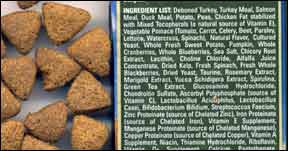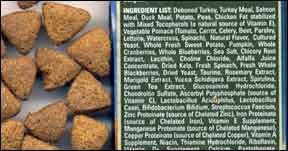Dog food manufacturers are supposed to list specific names for each ingredient in their formulations. Each food, vitamin, mineral, or other chemical (preservative, color, flavor, binder, etc.) that has been approved for use in a dog food is supposed to be listed in a certain way on the product’s ingredient list. There are formal descriptions of each ingredient – and all of these are listed in the annual “Official Publication of the Association of American Feed Control Officials (AAFCO)”.

288
However, we’ve noticed that some companies get a little liberal with their ingredient lists; they add a few enticing adjectives to make their ingredients sound even better than (perhaps) they are. Some of the ones we saw when we were typing in the first 10 ingredients of the highlighted products on our 2012 “approved dry dog foods” list:
Red Delicious Apples = apples
Sun-Dried Alfalfa Meal = alfalfa meal
Whole Ground Brown Rice = brown rice
Of course, the adjectives listed above make no difference to your dog at all. The embellishments are there to appeal to you, the consumer.
If a company leans out too far and actually makes the ingredient sound like something it’s just not, a state feed control official can issue a warning, or even order the product off the shelf until the company takes steps to remedy the label.
A few other adjectives do actually possess some legal significance:
Boneless, Deboned = These words, each with its own definition, indicate an animal protein product with less bone than if the adjective were not used. Most of the “meats” used in pet food actually contain quite a lot of bone, along with skin, fat, connective tissue, and muscle meat. If the ingredient specifies “boneless” or “deboned,” it obviously contains more meat than one that does not include this modifier. “Boneless” is defined as “the flesh resulting from removal of bones from accompanying flesh by means of knife separation.” “Deboned” is defined as “the flesh resulting from removal of bones from accompanying flesh by means of mechanical deboning.” Human-held knives, presumably, can remove more bone from flesh than machines can.
Natural = Here is the actual AAFCO definition of this word: “A feed or ingredient derived solely from plant, animal, or mined sources, either in its unprocessed state or having been subject to physical processing, heat processing, rendering, purification, extraction, hydrolysis, enzymolysis, or fermentation, but not having been produced by or subject to a chemically synthetic process and not containing any additives r processing aids that are chemically synthetic except in amounts as might occur unavoidably in good manufacturing practices.”
Organic = Must be certified as such by a third-party audit.





